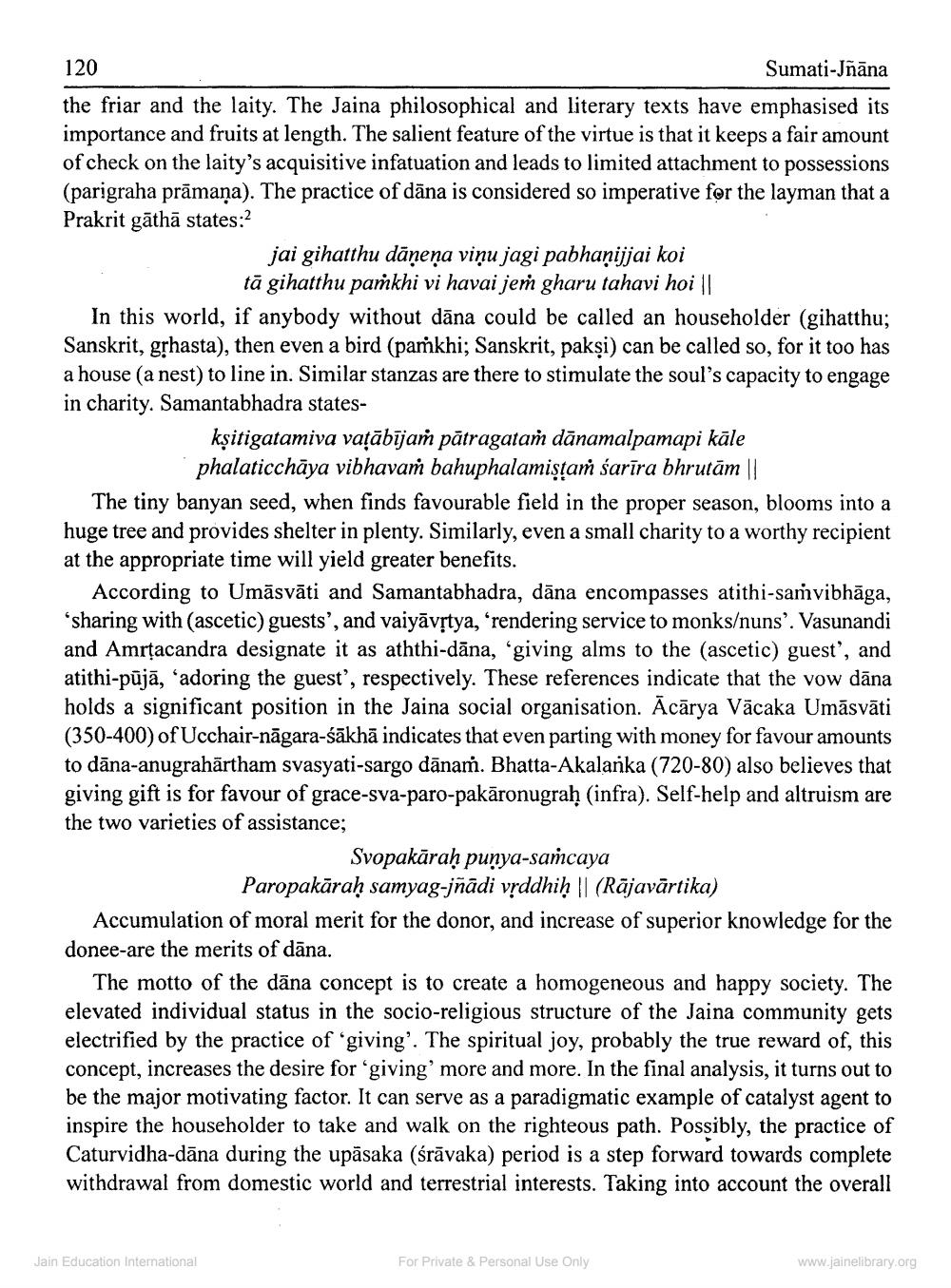________________
120
Sumati-Jñāna the friar and the laity. The Jaina philosophical and literary texts have emphasised its importance and fruits at length. The salient feature of the virtue is that it keeps a fair amount of check on the laity's acquisitive infatuation and leads to limited attachment to possessions (parigraha prāmana). The practice of dāna is considered so imperative for the layman that a Prakrit gāthā states:2
jai gihatthu dāņeņa viņu jagi pabhanijjai koi
tā gihatthu pańkhi vi havai jeṁ gharu tahavi hoi || In this world, if anybody without dāna could be called an householder (gihatthu; Sanskrit, gshasta), then even a bird (paṁkhi; Sanskrit, pakşi) can be called so, for it too has a house (a nest) to line in. Similar stanzas are there to stimulate the soul's capacity to engage in charity. Samantabhadra states
kșitigatamiva vaļābījaṁ pātragatam dānamalpamapi kāle
phalaticchāya vibhavam bahuphalamistam śarīra bhrutām || The tiny banyan seed, when finds favourable field in the proper season, blooms into a huge tree and provides shelter in plenty. Similarly, even a small charity to a worthy recipient at the appropriate time will yield greater benefits.
According to Umāsvāti and Samantabhadra, dāna encompasses atithi-samvibhāga, 'sharing with (ascetic) guests', and vaiyāvstya, 'rendering service to monks/nuns’. Vasunandi and Amrtacandra designate it as aththi-dāna, 'giving alms to the (ascetic) guest', and atithi-pūjā, 'adoring the guest, respectively. These references indicate that the vow dāna holds a significant position in the Jaina social organisation. Ācārya Vācaka Umāsvāti (350-400) of Ucchair-nāgara-śākhā indicates that even parting with money for favour amounts to dāna-anugrahārtham svasyati-sargo dānam. Bhatta-Akalarka (720-80) also believes that giving gift is for favour of grace-sva-paro-pakāronugrah (infra). Self-help and altruism are the two varieties of assistance;
Svopakāraḥ punya-samcaya
Paropakāraḥ samyag-jñādi vrddhiḥ || (Rājavārtika) Accumulation of moral merit for the donor, and increase of superior knowledge for the donee-are the merits of dāna.
The motto of the däna concept is to create a homogeneous and happy society. The
vated individual status in the socio-religious structure of the Jaina community gets electrified by the practice of 'giving'. The spiritual joy, probably the true reward of, this concept, increases the desire for giving' more and more. In the final analysis, it turns out to be the major motivating factor. It can serve as a paradigmatic example of catalyst agent to inspire the householder to take and walk on the righteous path. Possibly, the practice of Caturvidha-dāna during the upāsaka (śrāvaka) period is a step forward towards complete withdrawal from domestic world and terrestrial interests. Taking into account the overall
Jain Education International
For Private & Personal Use Only
www.jainelibrary.org




